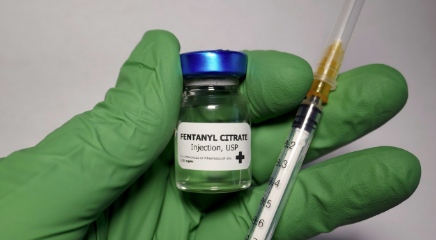OD deaths in Ky. dropped nearly 15% in 2018; officials credit many policy initiatives, but say ‘incredible challenges’ remain

By Melissa Patrick
Kentucky Health News
Kentucky saw a nearly 15 percent drop in drug-overdose deaths in 2018, the first decline since 2013, and almost three times the national decline of 5.1%.
Most of the deaths were again caused by fentanyl, a synthetic opioid that can be up to 50 times more potent than heroin, according to the annual Kentucky Office of Drug Control Policy report.
The state recorded 1,333 overdose deaths in 2018. That was 233 fewer than in 2017, when 1,566 were recorded. Toxicology reports are available for 1,298 of last year’s deaths; fentanyl was found in 786 autopsies, or nearly 61% — up from 52% in 2017 and 47% in 2016.
Van Ingram, executive director of the Office of Drug Control Policy, said in a news release that the overall decline was likely the result of the state’s many policy initiatives, along with a growing awareness about the dangers of opioids and the threat of overdose.
“We’ve pushed hard to develop the most comprehensive approach possible, combining education and treatment with a multitude of other harm-reduction strategies,” Ingram said. “We still have a great deal of work to do, but it’s clear that Kentucky’s efforts are making an impact.”
The report also found an increase in deaths caused by methamphetamine, a stimulant that has long plagued Kentucky. It was found in 428 cases, up from 357 in 2017.
The report found that overdose deaths from heroin, alprazolam and gabapentin all declined in 2018.
Heroin-related deaths dropped 30%, to 188 in 2018, from 270 in 2017. Deaths from alprazolam, an anti-anxiety medicine that is often known by its brand name Xanax, dropped 20%, to 214 cases, down from 269 in 2017.
Deaths from gabapentin, which sells under the brand names Neurontin, Gralise and Horizant, and is often taken along with other illicit drugs to enhance their effects, dropped 30%, to 255 cases, down from 363 in 2017. It also found that deaths related to oxycodone dropped, to 110 from 157 respectively, or 30%.
“The numbers are trending down, but our state still faces incredible challenges,” Justice and Public Safety Cabinet Secretary John Tilley said in the release.“This crisis claimed more than 1,300 lives last year and inflicted untold heartbreak on our families and communities. I only hope the latest numbers serve as evidence that strong interventions and better access to treatment can and do save lives.”
Of the 1,333 deaths, 1,247 of them, or 93.6 percent were Kentucky residents. County-by-county figures in the report are based on resident deaths, and are adjusted for age.
Boyd County (Ashland, Catlettsburg) had the highest rate of fatal overdoses in 2018, followed by Madison, Kenton, Clark and Campbell counties. Counties with fewer than 10 deaths were not included in that calculation, so only 23 counties have reported rates.
This story will be expanded.